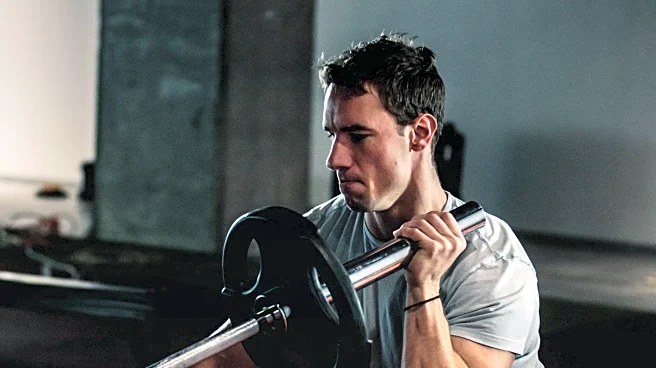What's Happening?
The concept of hybrid athlete training, which combines strength and endurance exercises, is gaining traction among fitness enthusiasts. This approach allows individuals to pursue multiple fitness goals simultaneously, such as running marathons while maintaining significant strength levels. Fitness personalities like Nick Bare and Ryan Hall have popularized this training style, showcasing their ability to balance heavy lifting with endurance sports. Hybrid training involves a balanced load of volume and recovery, allowing athletes to train for diverse challenges without overtraining. The trend is supported by scientific studies indicating that concurrent training does not interfere with muscle growth or strength gains.
Why It's Important?
Hybrid athlete training represents a shift in fitness culture, emphasizing versatility and overall health rather than specialization. This approach appeals to individuals seeking a balanced lifestyle, combining the benefits of strength training and cardiovascular fitness. It challenges traditional fitness paradigms that separate strength and endurance, offering a holistic method that can improve longevity and overall well-being. As more people adopt this training style, it could influence fitness industry trends, leading to the development of new programs and products catering to hybrid athletes.
What's Next?
The hybrid athlete trend is likely to continue growing, with more fitness enthusiasts exploring this balanced approach. Fitness brands may develop specialized programs and equipment to support hybrid training, while gyms could offer classes that integrate strength and endurance exercises. As the trend gains momentum, it may also influence sports training methodologies, encouraging athletes to incorporate diverse fitness elements into their routines. The ongoing popularity of hybrid training could lead to further scientific research, exploring its long-term benefits and potential applications in various sports.
Beyond the Headlines
Hybrid athlete training raises questions about the balance between specialization and versatility in fitness. It challenges the notion that athletes must focus solely on one aspect of fitness to excel, suggesting that a well-rounded approach can lead to better overall health. This trend may also impact the fitness industry economically, as companies invest in hybrid training products and services. Additionally, it could influence cultural perceptions of fitness, promoting a more inclusive and diverse understanding of what it means to be fit.










